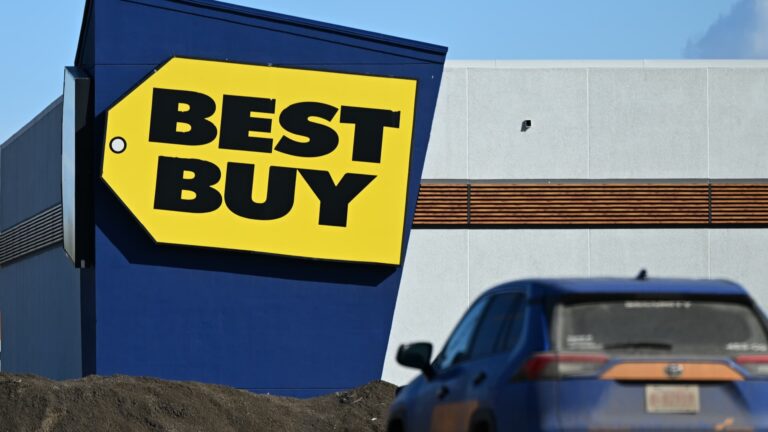Best Buy on Thursday missed quarterly revenue expectations and cut its full-year sales and profit guidance as higher tariffs increase the costs of many consumer electronics that it sells.
For its fiscal 2026, the retailer said it now expects $41.1 billion to $41.9 billion of revenue, down from its previous range of $41.4 billion to $42.2 billion. It said it expects adjusted earnings per share to range from $6.15 to $6.30, which compares to prior guidance of $6.20 to $6.60.
On the company’s earnings call, CEO Corie Barry said the company’s outlook anticipates that tariffs will stay at the current levels and there is “no material change in consumer behavior from the trends we have seen in recent quarters.”
“As you can imagine, and based on our history, we will continue to scenario-plan and adjust with agility as the situation evolves,” she said.
Barry said Best Buy is increasing some prices to cover tariff-related costs, but called it “a last resort” after it takes other steps to offset higher expenses. She did not specify on the earnings call what items could end up costing consumers more.
First-quarter earnings reports have highlighted just how disruptive Trump’s ever evolving trade policy has been to many U.S. companies that rely on a global supply chain. Best Buy joins other companies like Abercrombie & Fitch and Macy’s in cutting its profit outlook this week due to tariffs. Other businesses, such as E.l.f. Beauty, have declined to provide full-year guidance because of the levies.
Barry pointed to Best Buy’s strategic priorities for the year that will help the company increase profits and control costs. She said the company aims to improve the customer experience to better connect its digital and in-store businesses, launch and grow its third-party marketplace and advertising businesses and drive efficiency “to fund strategic investments and offset pressures.”
Here’s how the consumer electronics company did compared with what Wall Street was expecting for the company’s fiscal first quarter, based on a survey of analysts by LSEG:
Earnings per share: $1.15 adjusted vs. $1.09 expectedRevenue: $8.77 billion vs. $8.81 billion expected
Shares fell nearly 3% in premarket trading.
Best Buy’s net income in the three-month period that ended May 3 declined about 18% to $202 million, or 95 cents per share, from $246 million, or $1.13 per share, in the year-ago period. Excluding one-time expenses, including restructuring charges for its Best Buy Health business, the company reported earnings of $1.15 per share.
First-quarter revenue dropped from $8.85 billion in the year-ago period.
Comparable sales, defined by Best Buy as revenue from online sales and stores open at least 14 months, dropped 0.7% year over year. In the U.S., comparable sales also fell 0.7% year over year as shoppers bought fewer home theaters, appliances and drones than a year ago. The company said weakness in those categories was partially offset by growth in the computing, mobile phone and tablet categories.
Best Buy is a closely watched name when it comes to the impact of tariffs since it sells iPhones, TVs, laptops, kitchen appliances and many other consumer electronics that tend to be made in China or other parts of Asia. That’s why Barry said on a March earnings call that the retailer would likely have to raise prices because of the duties.
However, Barry said on an earnings call Thursday that Best Buy’s mix of imports has changed in recent months. China continues to be a major source of merchandise, but the country now accounts for 30% to 35% of its merchandise compared to the 55% metric that it shared on its March earnings call.
About 25% of its merchandise comes from U.S. or Mexico, which do not have tariffs due to domestic production or exemptions, she said. The remaining roughly 40% comes from other areas, including Vietnam, India, South Korea and Taiwan, which are subject to a 10% tariff.
The U.S. currently has an up to 30% tariff on imports from China, while goods compliant with the United States-Mexico-Canada Agreement are exempt from the Trump administration’s 25% duty on Mexico. It is unclear now how those rates will change after a federal trade court struck down many of Trump’s tariffs on Wednesday.
Barry on the Thursday earnings call outlined ways that Best Buy is adjusting to current tariffs, while acknowledging the backdrop could change after the court ruling. The vast majority of what the retailer sells — about 97% or 98% of its merchandise — is imported by vendors rather than directly by the company.
Best Buy has encouraged vendors to manufacture in multiple countries, negotiated lower costs and adjusted the mix of merchandise that it carries, she said.
As of Wednesday’s close, shares of Best Buy are down nearly 17% so far this year. That trails behind the roughly flat performance of the S&P 500 year to date. Shares of Best Buy closed at $71.52 on Wednesday, bringing the company’s market value to $15.14 billion.

